
Accelerator cohorts

TECHNOLOGY POLICY ACCELERATOR COHORT
Members of the Day One Technology Policy Accelerator bring a diverse range of experiences to the policymaking process. This cohort includes entrepreneurs, academics, and policymakers thinking about cutting-edge technology policy issues. Each member of the cohort will work to develop a catalytic proposal for action over the course of 9 weeks in one of the following policy areas:
The Day One Project Technology Policy Accelerator seeks to identify, develop, and publish a set of technology policy ideas that could be implemented by Congress or the Biden-Harris Administration.
DISINFORMATION
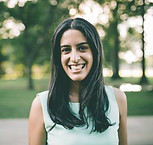
CRISTINA MARTÍNEZ PINTO
Cristina Martínez Pinto is a Senior Research Scientist at West Virginia University’s Human Computer Interaction (HCI) Lab, and the Founder and CEO of the PIT Policy Lab, working at the intersection of Public Interest Technology and agile policymaking. She has worked as a Digital Transformation Consultant at the World Bank, led C Minds' AI for Good Lab and co-founded Mexico's National AI Coalition IA2030Mx. Cristina holds a Master in Public Policy from Georgetown University and a B.A. in International Relations from the Tec de Monterrey. She is a member of the World Economic Forum (WEF) Global Shapers community.

SAIPH SAVAGE
Saiph Savage is the director of the Human Computer Interaction Lab (HCI) at West Virginia University where she conducts HCI research in A.I. and Civic Technology. She is one of the 35 Innovators under 35 by the MIT Technology Review, and a fellow at the Center for Democracy & Technology. Her work has been covered in the BBC, and the New York Times. Dr. Savage has experience collaborating with Federal Governments to drive them to adopt Human Centered Design and A.I. Saiph holds a bachelor’s degree in Computer Engineering from the National Autonomous University of Mexico (UNAM), and a Ph.D. in Computer Science from the University of California.
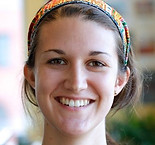
HILARY ROSS
Hilary Ross is currently a senior program manager at the Berkman Klein Center for Internet & Society at Harvard University. Her work focuses on disinformation, the future of news, governance of speech online, and effective management practices. Previously, she worked in communications at the World Resources Institute, a global research organization; managed educational programs at a branch of the nonprofit Big Brothers Big Sisters; taught as a Fulbright Fellow in Vietnam; and was a 2017 State of the Net Fellow. Hilary holds an MA from the Fletcher School at Tufts University, where she specialized in technology policy and international communication.
ALBERT FOX CAHN
Albert Fox Cahn is the Surveillance Technology Oversight Project’s (S.T.O.P.’s) founder and executive director, a member of the Ashoka Fellowship Network, and a fellow at the Engelberg Center on Innovation Law & Policy at N.Y.U. School of Law. Mr. Cahn is a frequent commentator on civil rights, privacy, and technology matters, and he has authored over 100 op-eds, including pieces for the New York Times, Boston Globe, Wired, The Guardian, Slate, and more. Mr. Cahn received his J.D., cum laude, from Harvard Law School and his B.A. in Politics and Philosophy from Brandeis University.

MICHAELA LEE
Michaela Lee works at the intersection of emerging technology, policy, and human rights. She is currently pursuing a Master in Public Policy at the Harvard Kennedy School and is a Research Assistant with the Belfer Center, focused on cyber, emerging tech, and international security. Prior to joining the Kennedy School, Michaela served as a Tech and Human Rights Manager at BSR, where she covered responsible AI, end-to-end encryption, disinformation and hate speech, and platform governance. She was an Assembly Fellow on disinformation with the Berkman Klein Center for Internet & Society at Harvard and a Coro Fellow in Public Affairs.

KENNY CHEN
Kenny Chen is a Master in Public Policy student at the Harvard Kennedy School, and a researcher at Harvard’s Technology and Public Purpose Project. He applies a cross-sector and multidisciplinary background toward exploring concepts of trust and trustworthiness in human-AI systems. Previously, Kenny served as Co-Founder and Executive Director of the Partnership to Advance Responsible Technology (PART) and PGH.AI. He remains an active member of various international communities and initiatives around AI ethics, policy, and governance, including XPRIZE, AI Commons, and the UN’s AI for Good platform.
SECURING THE INTERNET

ALBERT FOX CAHN
Albert Fox Cahn is the Surveillance Technology Oversight Project’s (S.T.O.P.’s) founder and executive director, a member of the Ashoka Fellowship Network, and a fellow at the Engelberg Center on Innovation Law & Policy at N.Y.U. School of Law. Mr. Cahn is a frequent commentator on civil rights, privacy, and technology matters, and he has authored over 100 op-eds, including pieces for the New York Times, Boston Globe, Wired, The Guardian, Slate, and more. Mr. Cahn received his J.D., cum laude, from Harvard Law School and his B.A. in Politics and Philosophy from Brandeis University.
AMERICAN BROADBAND

CAROLINE STRATTON
Caroline Stratton is an assistant professor in the School of Information at Florida State University. Her research agenda is focused on how organizations may effectively design and implement interventions with technology for social good. Her recent work examines policies and programs intended to reduce digital inequality in urban and rural regions of the US. Caroline holds a PhD in Information Studies from the University of Texas at Austin and a BS in Nuclear & Radiological Engineering from the Georgia Institute of Technology.
QUANTUM INFORMATION SCIENCE

ELIE ALHAJJAR
Elie Alhajjar is a research scientist at the Army Cyber Institute and a faculty member at the United States Military Academy in West Point, NY, where he teaches and mentors cadets from all academic disciplines. Prior to joining USMA, he had a research appointment at the National Institute of Standards and Technology (NIST) in Gaithersburg, MD. His research work is supported by multiple grants and fellowships. Dr. Alhajjar holds a Master of Science and a PhD in mathematics from George Mason University, as well as master’s and bachelor’s degrees from Notre Dame University.
RACIAL EQUITY & TECHNOLOGY POLICY
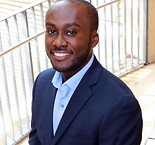
STEPHEN CAINES
Stephen Caines is a second year residential fellow at Stanford Law School’s CodeX and a legal technologist with a passion for privacy and access to justice. His work primarily focuses on facial recognition use by governments and law enforcement, as well as examining the impacts of other emerging technologies. Stephen is a co-founder of the CoronAtlas dashboard, a free pandemic resource open to the general public and currently serves on the San Jose Digital Privacy Advisory Task Force. His work has been featured in Forbes, CodeX’s FutureLaw Conference, the World Economic Foundation, in addition to a number of podcasts.
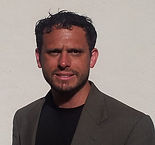.jpg)
DAVID D. L. MASCAREÑAS
David D. L. Mascareñas earned his Ph.D. and M.S. in structural engineering at the University of California San Diego, in La Jolla, CA in 2008 and 2006 respectively. He received the B.S. in mechanical engineering at Colorado State University in Fort Collins, CO in 2004. He worked as a laboratory manager at SAIC/Sullivan International in 2009 to develop systems health monitoring software for ground-based robots. In 2010 he was a Director's funded postdoctoral researcher at Los Alamos National Laboratory. In 2012 he was converted to a technical staff member at the Los Alamos National Laboratory

DEMETRIUS NORMAN
Demetrius Norman serves as President and Board Chair for NWLA Makerspace of Shreveport, LA. Demetrius is a native of Shreveport and a proud HBCU graduate of Grambling State University with a B.S. in Electronic Engineering Technology. He has worked in IT for over a decade with experience in Building Automation System Design, Energy Management, Solar Engineering, Internet of Things, Cloud Management and currently, serves as a technical consultant in the IT industry.

EVA ZHANG
Eva Zhang is a senior and AI researcher at Stanford pursuing a B.S. in Mathematics and M.S in Computer Science. She previously designed, led, and co-taught a computer science class on interpretability and fairness at Stanford. She has spent time working on projects in tech. policy, research, and engineering at the Stanford Machine Learning Group, World Bank Group, Google, NASA, and the Compton Pledge.

GRANT GORDON
Grant Gordon is a Stanford student currently on leave at Sequoia, working to support Sequoia's founders on narrative, product and strategy. He also works to support student founders through BASES and Cardinal Ventures, a nonprofit start-up accelerator. Formerly, he worked for the Research Director of Rebuild by Design, and one of the competition winners, ONE Urbanism + Architecture, designing Community Engagement strategies for climate infrastructure projects.

KATIE JONSSON
Katie Jonsson is an undergrad at Stanford University majoring in International Relations. She is interested in the intersection of innovation, technology and government. She has spent the past year as Chief of Staff at an early stage defense start-up and working at the Stanford Internet Observatory.
FUTURE OF WORK

CYRUS HODES
Cyrus Hodes is a Partner at FoundersX Ventures, a VC firm based in Silicon Valley. He is the co-founder and Chair of the AI Initiative at The Future Society—a 501(c)3 incubated at Harvard Kennedy School— where he leads the Global Data Access Framework (GDAF) project with UN Global Pulse and McKinsey Noble Purpose AI. Cyrus is the co-founder of stability.ai where he initiated the Collective and the Augmented Intelligence Against COVID-19 (CAIAC) project, together with Stanford HAI, advised by leading UN agencies. He is a member of the Global Partnership on AI (GPAI), of the OECD Expert Group on AI (ONE AI), and of the European Parliament STOA international Panel. Educated at Sciences Po Paris, M.A. Paris II University in Defense & Geostrategy, M.P.A. Harvard.

MAYANK KEJRIWAL
Dr. Mayank Kejriwal is a research assistant professor and research lead at the University of Southern California. Dr. Kejriwal’s research focuses on Artificial Intelligence and their application to complex systems, including crisis response and fighting human trafficking. His work has been funded by DARPA, IARPA, corporate grants and philanthropic foundations, and his research on AI-centric solutions for human trafficking has been transitioned and recognized on a national level. He is the author of ‘Knowledge Graphs: Fundamentals, Techniques and Applications’ (MIT Press, March 2021).

NIKI ILIADIS
Niki Iliadis is an international specialist in responsible AI. Her research interests include AI’s impact on SDGs, AI’s implications on children, and agile governance processes for the responsible adoption of AI. Currently working as Senior AI Policy Researcher for The Future Society, she is supporting national AI policies and global AI governance initiatives. Previously, she led the delivery of the APPGAI, an initiative in the UK Parliament gathering evidence on the economic and socio-ethical impact of AI, and using that to shape policy. She holds a BSc in Political Science from UC Berkeley and an MSc in Public Management from LSE.

TAYAB WASEEM
Tayab Waseem specializes in integrating emerging technologies in medicine, research, and policy. He received his bachelor's degrees in Biology and Bioinformatics from VCU and his doctorate in Immunology from EVMS. He’s currently an AAI public policy fellow and MD candidate at EVMS. He serves on several biomedical and health-technology boards and is well respected on the global stage with over 100 peer-reviewed publications, articles, and presentations. His unique blend of expertise in biomedical research, medicine, big data, and policy has made him a sought-after consultant and keynote speaker for many groups including the WHO, UN, and White House OSTP.

REBECCA AGOSTINO
Rebecca Agostino is an MBA Candidate at The Wharton School at the University of Pennsylvania. Previously, she was the founding principal of Freedom Prep High School, a college-preparatory school in Camden, New Jersey, and a special educator in New York City. She is a New Leaders Council Philadelphia Fellow, a School Board Member at New Foundations Charter School, and the author of an Accelerator for America Playbook of Best Practices, “Place-Based Solutions for a Stronger Workforce Ecosystem.” Rebecca graduated as a Robertson Scholar from Duke University with a BS in Economics and earned a Master of Teaching from Fordham University.
TECHNOLOGY AND TRADE

GEORGE SARPONG
George Sarpong has over 20 years experience in media and communications law, policy and regulation in Africa. He is the Executive Secretary of Ghana’s National Media Commission where he coordinates policy interventions to insulate the media from external controls. George has been involved in pro-democracy work across Africa especially promoting freedom and independence of the media. He was a founding team member of the Media Foundation for West Africa and founded the Youth Network for Human Rights & Democracy (you-net), Party Youth Forum and the Young Leaders Program. He was a 2018 Reagan-Fascell Fellow of the National Endowment for Democracy.

KENTARO TOYAMA
Kentaro Toyama is W. K. Kellogg Professor of Community Information at the University of Michigan School of Information, a fellow of the Dalai Lama Center for Ethics and Transformative Values at MIT, and author of "Geek Heresy: Rescuing Social Change from the Cult of Technology." He conducts research on digital technology's impact on society. Kentaro previously taught at Ashesi University in Ghana and co-founded Microsoft Research India, where he did research on the application of information and communication technology to international development.
AUTONOMOUS VEHICLES

NICHOLAS GIUDICE
Nicholas Giudice is Professor of Spatial Computing in the School of Computing and Information Science at the University of Maine. His research deals with spatial cognition and information access by blind and visually impaired (BVI) people and sighted folks in eyes-free situations. He focuses on the design and evaluation of accessible multimodal technology supporting graphical access, mapping, and autonomous navigation. He has published over 100 scientific papers in these areas, is on the editorial board of two accessibility journals, the board of directors of two blindness-related organizations, and the scientific advisory board of two information-access companies.

PAUL FINK
Paul Fink is a Graduate Researcher at the Virtual Environment and Multimodal Interaction (VEMI) Lab at the University of Maine. Prior to joining VEMI, Paul coordinated the assessment of the University of Maine’s five-year strategic plan under the direction of the University Provost. Paul’s research intersects technology education, user experience, and accessibility, with current work including the design of accessible interactions in fully autonomous vehicles for people who are blind and visually impaired. Paul is receiving his Ph.D. in Spatial Information Science and Engineering with support from the U.S. Department of Transportation’s Inclusive Design Challenge.
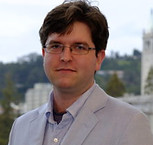
THOMAS KRENDL GILBERT
Thomas Krendl Gilbert is an interdisciplinary Ph.D. candidate in Machine Ethics and Epistemology at UC Berkeley. He investigates the ethical and political predicaments that emerge when artificial intelligence reshapes the contexts of human decision-making. His work examines how specific algorithmic learning procedures reframe classical ethical questions and recall the foundations of democratic political philosophy, namely the significance of popular sovereignty for resolving ambiguities in norms. This work has concrete implications for the design of automated vehicle systems that are fair for distinct subpopulations, safe when enmeshed with municipal institutions, and accountable to public concerns.
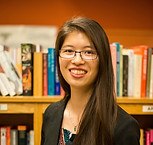
CATHY WU
Cathy Wu is an Assistant Professor at MIT in the Laboratory for Information and Decision Systems. She holds a PhD from UC Berkeley, and B.S. and M.Eng from MIT, in Electrical Engineering and Computer Science, and completed a Postdoc at Microsoft Research. She studies machine learning and urban systems. Her research focuses on the computational challenges surrounding the integration of autonomy into society. Her work has been acknowledged by several awards, including the 2019 IEEE ITSS Best Ph.D. Dissertation Award, the 2016 IEEE ITSC Best Paper Award, and fellowships from NSF, Berkeley Chancellor, NDSEG, and Dwight David Eisenhower.

MICHAEL DENNIS
Michael Dennis is a PhD Candidate at the Center for Human-Compatible AI. His work focuses on AI safety, robustness in reinforcement learning, and understanding how to make the interaction between AI systems and society at large more robustly beneficial.
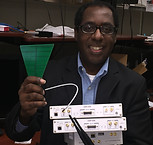
BRIAN KELLEY
Brian Kelley, Associate Professor in Electrical and Computer Engineering, joined the University of Texas at San Antonio (UTSA) in 2007. He received his BSEE from Cornell University, graduating Tau Beta Pi and Eta Kappa Nu, and MSEE/PhDEE from Georgia Tech. He has 11 US patents, over 60 publications, was previously Associate Editor of the IEEE System Journal, and has over 3M in funded research. Current research include 5G/6G, Mobile Edge Computing, Autonomous Vehicle Infrastructure, Artificial Intelligence, and Security. Dr. Kelley has been the 5G JBSA PMO Principal Investigator in 5G Core Security and 5G Telemedicine since 2020.

JUNMIN WANG
Junmin Wang is the Accenture Endowed Professor in Mechanical Engineering at the University of Texas at Austin since August 2018. Prof. Wang’s research interests cover control, modeling, estimation, optimization, and diagnosis of dynamical systems, especially for automotive, vehicle, transportation, smart, and sustainable mobility applications. Prof. Wang’s research programs have been funded by NSF, ONR, DOE, NHTSA, and the Texas Department of Transportation. Dr. Wang is the author or co-author of more than 330 peer-reviewed publications. Prof. Wang SAE Fellow (2015), ASME Fellow (2016), and serves as Editor for the IEEE Vehicular Technology Magazine and IEEE Transactions on Vehicular Technology.

KARA KOCKELMAN
Kara Kockelman, Ph.D./MS/BS from UC Berkeley, is the Dewitt C. Greer Professor of Engineering at U.T. Austin and a recognized expert on autonomous vehicle (AV) use, shared AV systems, travel demand forecasting, traffic patterns under congestion pricing, and managed lanes and economic policies. Research projects include travel demand, economic, traffic, safety, and other impacts of connected and autonomous vehicles. Dr. Kockelman received the MIT Top 100 (Young) Innovators Award (2002), NSF CAREER Award (2000-2004), ASCE’s Harland Bartholomew Award for transportation planning contributions (2007), a Google Research Award (2014) for her travel demand modeling work on autonomous vehicles.
DIGITAL MENTAL HEALTH

STEPHEN SCHUELLER
Stephen Schueller is an Associate Professor of Psychological Science and Informatics at the University of California, Irvine. As a clinical psychologist and mental health service researcher, his work broadly looks at making mental health resources more available and accessible, especially through the use of technology. He also serves as the Executive Director of One Mind PsyberGuide, a non-profit project that aims to empower consumers to make informed decisions around digital mental health products. He received his PhD from the University of Pennsylvania and completed his clinical internship at the University of California, San Francisco in the Public Service and Minority Cluster.
